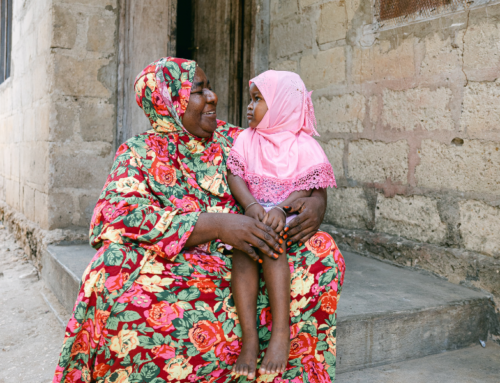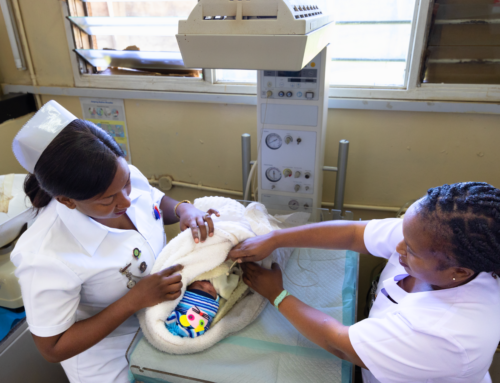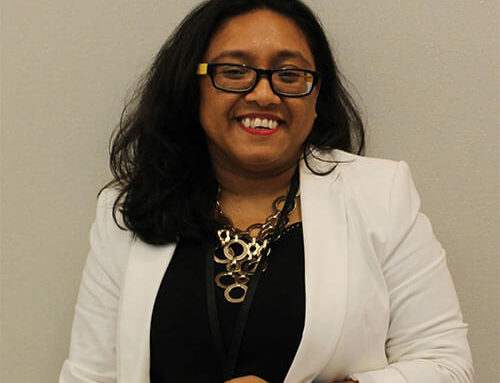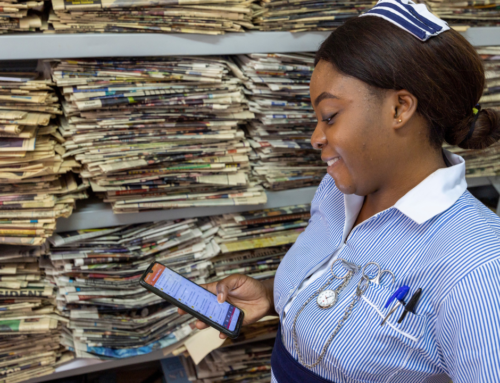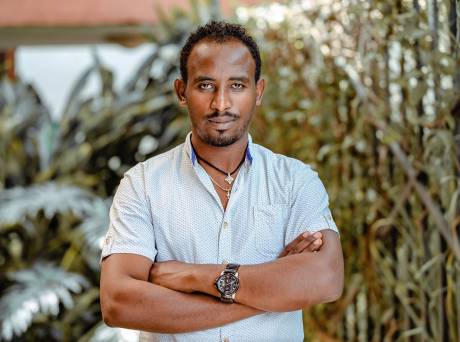
Meet Dessie, a champion who is working to end female genital mutilation/cutting (FGM/C) in Ethiopia.
“I’m Dessie. I’m 33-years-old and from Ethiopia’s Amhara region. I’m a proud father of a girl and a boy who are the world to me.”
Can you tell us more about your background?
“I have a background and degree in health work. Before I started working at Amref Health Africa, I worked for several years as a public health officer. I’m always a person who wants to take care of people; it’s in my nature. It’s in my health work that I started to notice a bad thing called female genital mutilation, or female genital cutting (FGM/C). I saw pregnant women coming to the hospital who were having complications during their delivery. Even a lot of women died giving birth. I thought it was horrible to see a mother losing her life and also losing a baby. So many unnecessary deaths. I noticed that this had to do with FGM/C and all the complications it caused. That’s where I started my journey in ending this horrible practice. When I got in touch with Amref, I knew from that point on this would be my new purpose in life: as a champion to end FGM/C.”
Can you describe the work you do for Amref Health Africa?
“I’ve been working at Amref Health Africa in Ethiopia for four years now as a project officer. During my four years working with the Yes-I-Do project, I have focused on ending FGM/C and all violence against girls and women along with promoting sexual and reproductive health and rights. I also became an official Pan-African Champion to end FGM/C. In Ethiopia, a lot of girls are subjected to FGM/C at a young age, sometimes just after they are born. As a champion, I therefore give education at health centres.
I noticed since my time as a public health officer that there are still many health workers who are not well informed about the dangers of FGM/C. If you start educating the health workers, you have a good entry point with the mothers because they are the ones that have to follow up and do checkups with the pregnant women. I am in close contact with health workers and they trust me.”
What is your motivation to do this work?
“As a father who loves his daughter very much I want this practice of FGM/C to end. I want my daughter and all other girls in Ethiopia to grow up and live a healthy life. I saw a lot of women die during labour while I was working as a public health officer. It feels so powerless to lose a mother over something which can be prevented. I know we have a long way to go but every step we take is one in a good direction.”
How has COVID-19 affected your area?
“Many things have changed. The first month of the lockdown we couldn’t do anything. I started to notice that child marriages were increasing because schools were closed. In the Amhara region, over 700 marriages happened.
Because of school closure, a safe place for girls is gone. School is also the place where they receive information about family planning, teenage pregnancies and early marriages. The girls often start working in the flower farms in my region because they don’t have better things to do and their parents ask them to help earn money. This is terrible because most of them will not go back to school once their parents get used to the money they earn. I think this is wrong. Young girls need to be in school and not doing any child labour. Girls who work at the flower farms at a young age also have a higher risk of getting pregnant because they lack information they would receive at school.”
What are you doing to help women and girls during the pandemic?
“We didn’t keep silent. I couldn’t reach all the communities anymore [because of public health restrictions on travel] so Amref Health Africa gave me a platform and introduced me to the local radio. There, I could continue to use my voice for change and reach thousands of households.
I also did door-to-door education and tried to visit the local health centre for my dialogues with the nurses. I remember one girl who I spoke to during this pandemic. She went with her mother to the health facility because her mother wanted to get contraceptives. We started talking and I started to notice something strange was going on. My gut feeling said I had to check in on her and I found out that her mother wanted to marry her off. I went to the mother later that week to convince her to keep her girl at home and eventually the girl went back to school in October when schools opened again. The mother resisted me at first but I touched based with the government leader and local elder and together we were able change her mind.
I’m proud that our government is seeing Amref as an important partner to end FGM/C. They called us because they also noticed that FGM/C and early marriages where rising [during COVID-19]. So, I organized a meeting with the districts, health offices and government. We sat around the table and made a plan of action how we could protect our girls. And with good results. We received face masks so we could visit the local communities while keeping social distancing.”
What is your goal?
“My vision is to see a world free of FGM/C and child marriage. We are taking small steps but this pandemic made me think that we need to intensify our work to protect our girls. I hope Amref Health Africa is able to educate even more health workers and champions on-the-ground so we can end this vice. The impact of COVID-19 on our health is big but it has made an even bigger impact for the rights of women and girls. We need to invest more in sexual and reproductive health and rights services and to make sure the rights of girls are protected.”

